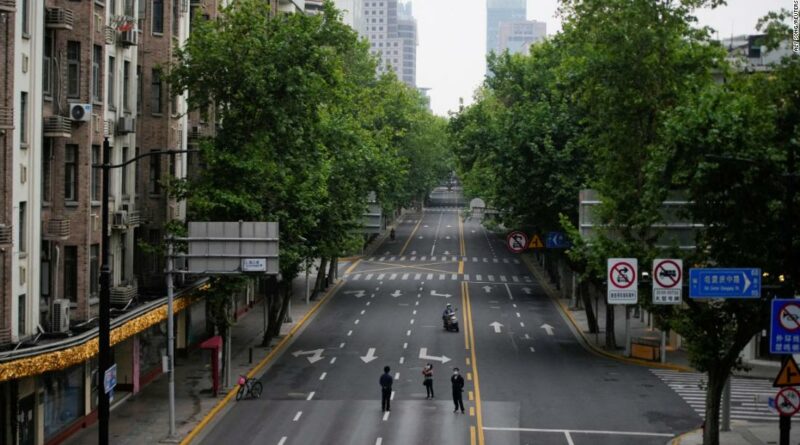Chinese officials urge government action to revive Covid-battered economy
Hong Kong (CNN Business)China’s economy showed some signs of improvement in May, but retail sales contracted for a third month in a row, indicating that Covid outbreaks continued to significantly depress consumer spending.
Retail sales fell 6.7% in May from a year ago, according to China’s National Bureau of Statistics on Wednesday. That was slightly better than the 11.1% plunge in April, but still marked a third straight month of declines.
There was more bad news on the economy, with youth unemployment soaring to a fresh record, as services industries that tend to hire younger workers were hit hardest by business shutdowns and restrictions on consumer activities.
The Chinese economy has been reeling from the worst Covid outbreak in two years and its zero-tolerance approach to the virus. Many cities have been placed under full or partial lockdowns since March, wreaking havoc on activity, especially retail sales — which accounts for about 38% of GDP. Analysts are worried that the Chinese economy could contract in the second quarter.
Data from Wednesday showed consumer spending dropped in nearly every category last month — except food, drink, and petroleum — underscoring the weak sentiment.
Catering sales shrank 21% in May, the most of all, as Covid restrictions forced restaurants to shut down and kept consumers at home. Car purchases also plunged 16%, as people were less inclined to spend more when they fear they could be locked down for months at home and lose income.
“Affected by unexpected factors such as the complex and severe international environment and domestic Covid outbreaks, the downward pressure on the economy has increased in the second quarter,” said Fu Linghui, a spokesman for the NBS, at a press conference on Wednesday.
The Covid outbreaks continued to have an adverse impact on the job market, he said.
The unemployment rate for those aged 16-24 rose further to 18.4% in May, a new record high, after hitting 18.2% in April.
“The high youth unemployment needs to be taken seriously,” Fu said.
Businesses are having a hard time operating amid Covid outbreaks, he added.
The service sector, which is a mainstay of employment and usually hires a large number of young workers, was hit particularly hard. Output from the sector contracted 5.1% last month, a third monthly drop in a row, Wednesday’s data showed.
Chinese college students are also facing the toughest graduation season ever, with a record 10.76 million set to graduate in the next two months. In a joint statement by several ministries last week, the government even urged college graduates to seek jobs in the nation’s vast but less developed countryside.
There are some bright spots, though.
Industrial production slightly improved last month. Manufacturing output rose 0.7% in May, reversing a 2.9% contraction in April.
Fixed-asset investment also increased 6.2% for the first five months of this year, better than market expectations. The growth was largely driven by stronger capital spending in manufacturing and infrastructure.
“The May data suggest that a lockdown recovery got underway across most parts of the economy last month. It is likely to have progressed further in June,” wrote Sheana Yue, China economist for Capital Economics.
But as the economy slowly reopens, the Covid-19 remains a risk.
“Even if further lengthy citywide lockdowns like that in Shanghai are avoided, the zero-Covid strategy means that targeted lockdowns will remain commonplace, depressing consumer activity and spending,” she said.
The recovery in consumer activity “still has a longer way to go than that in industry,” she added.
Key cities across China had gradually loosened Covid restrictions earlier this month, with daily life starting to return to normal. But some neighborhoods in Shanghai and Beijing were hit by fresh Covid outbreaks last week and were placed on lockdowns again.
The property market, which accounts for as much as 29% of China’s GDP, also remains weak.
Property sales fell 31.5% from January to May, accelerating from the 21% drop recorded for the first four months of this year, data showed on Wednesday. Property investment also decreased 4%.
A recent survey by China Real Estate Information, a leading private property research firm, indicated that sales by the country’s top 100 developers collapsed 59% in May from a year ago.
Zhiwei Zhang, president and chief economist for Pinpoint Asset Management, said China’s economy is facing “the most severe challenge in the past 30 years.”
“With the risk of outbreaks and lockdowns looming, consumers and entrepreneurs have become quite cautious. The change of their behavior dampens economic activities,” he said.
“This means the economy would likely run below its potential unless the government takes decisive actions to boost growth,” Zhang added.
Economists from ING Group on Wednesday maintained their GDP forecast at a 1% contraction for the second quarter.
That’s because “we expect small lockdowns will continue to affect the economy in June,” said Iris Pang, chief economist for Greater China at the firm.
Source: Read Full Article







